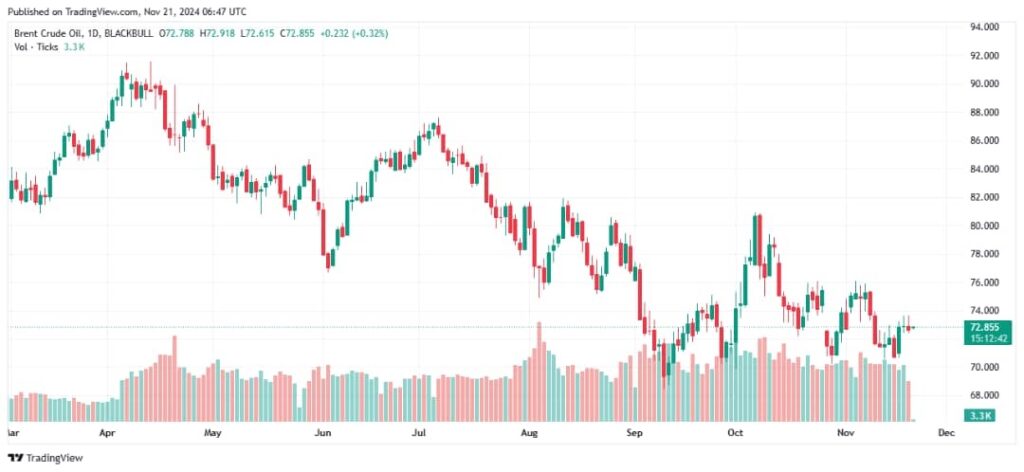
Akintunde Oyedokun
Research Analyst
Oil prices rose slightly on Tuesday, with Brent crude closing at $72.19 per barrel (+0.07%) and U.S. WTI at $68.59 (+0.32%). Gains were fueled by China’s increased crude imports and expectations of looser monetary policy in 2025 to spur growth. European winter supply concerns also supported prices.
Analysts pointed out that China’s import surge was more about stockpiling than demand growth. Meanwhile, limited geopolitical risks from Syria and anticipation of a potential U.S. Federal Reserve rate cut further shaped market sentiment.
RBA Signals Possible February Rate Cut Amid Softer Economic Data
The Reserve Bank of Australia (RBA) held its cash rate at 4.35% during its December meeting but signaled a potential shift toward easing monetary policy. The central bank removed its earlier stance of “not ruling anything in or out,” reflecting growing confidence that inflation is nearing its target range.
Markets now see a 57% chance of a February rate cut, with easing fully priced by April. While headline inflation fell to 2.8% in Q3, driven by temporary government rebates, core inflation remains high at 3.5%. Weak economic growth and modest wage increases contrast with a resilient labor market, partly bolstered by public sector jobs.
Governor Michele Bullock emphasized that future rate decisions hinge on upcoming data, stating, “We’re watching the data closely.
China’s Trade Slows Amid Rising Global Risks
China’s exports grew just 6.7% in November, missing forecasts, while imports fell 3.9%, marking their worst decline in nine months. These figures signal mounting challenges for the world’s second-largest economy as Donald Trump’s upcoming presidency brings renewed trade tensions. Beijing has pledged increased stimulus in 2025 to boost domestic demand, while exporters brace for new U.S. tariffs and rising tensions with the EU over electric vehicle duties.
Egypt’s Inflation Drops To 25.5% In November, Lowest Since 2022
Egypt’s annual inflation rate eased to 25.5% in November, the lowest level since December 2022, according to CAPMAS. Inflation had surged after the 2022 Russian invasion, peaking at 38% in September 2023. By October 2024, it had declined to 26.5%. Monthly inflation rose by 0.5% in November, down from 1.1% in October, while food prices fell by 2.8%, though still 23.3% higher than a year earlier.
Core inflation, which excludes volatile items like fuel and some foods, slowed to 23.7% year-on-year in November. The easing of inflation comes amid a 29.5% year-on-year rise in Egypt’s M2 money supply, which has contributed to inflationary pressures.
BOI Allocates N22.89bn To Support Struggling Manufacturers Sector
The Bank of Industry (BOI) has disbursed N22.89 billion to 29 manufacturers as part of efforts to support Nigeria’s struggling manufacturing sector amid high production costs and poor sales. The funding is part of a broader N75 billion initiative aimed at revitalizing the sector and fostering SME development. BOI MD Dr. Olasupo Olusi stressed the need for government-SME collaboration to tackle challenges and ensure sustainable growth. The sector faces significant challenges, including a $160bn funding gap and a declining contribution to GDP.








